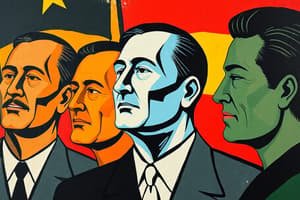Podcast
Questions and Answers
What is a key characteristic of totalitarian governance?
What is a key characteristic of totalitarian governance?
- Absolute power held by a ruler (correct)
- Guaranteed rights for all citizens
- Allowing multiple political parties
- Separation of powers within government
Which of the following contributed to the rise of totalitarian regimes in Europe during the 1930s?
Which of the following contributed to the rise of totalitarian regimes in Europe during the 1930s?
- Democratic governance effectiveness
- Economic prosperity
- Post-World War I stability
- Post-World War I instability (correct)
What distinguishes democratic governments from totalitarian systems in terms of political participation?
What distinguishes democratic governments from totalitarian systems in terms of political participation?
- Confined to a single political party
- Participation limited to elite groups
- Freedom to form multiple political parties (correct)
- Mandatory government-approved opinions
How do democratic governments ensure the rights of their citizens?
How do democratic governments ensure the rights of their citizens?
Which factor did NOT contribute to the rise of totalitarian regimes in Europe?
Which factor did NOT contribute to the rise of totalitarian regimes in Europe?
What role did propaganda play in totalitarian states?
What role did propaganda play in totalitarian states?
In totalitarian regimes, how is the population typically monitored?
In totalitarian regimes, how is the population typically monitored?
Which of the following best describes the political structure of totalitarian regimes?
Which of the following best describes the political structure of totalitarian regimes?
Flashcards
Totalitarian Governance
Totalitarian Governance
A system of governance where a single ruler holds absolute power, without any checks or balances.
One-Party System
One-Party System
A political system where only one political party exists, eliminating competition and opposition.
Restricted Rights in Totalitarianism
Restricted Rights in Totalitarianism
In a totalitarian system, individuals' freedoms are restricted through methods like secret police and media censorship. Propaganda is used to promote the state's agenda.
Democratic Governance
Democratic Governance
Signup and view all the flashcards
Freedom and Participation in Democracy
Freedom and Participation in Democracy
Signup and view all the flashcards
Post-War Instability
Post-War Instability
Signup and view all the flashcards
Discontent with Peace Treaties
Discontent with Peace Treaties
Signup and view all the flashcards
Economic Depression's Impact
Economic Depression's Impact
Signup and view all the flashcards
Study Notes
Totalitarianism
- Totalitarianism is an ideology or political system where the ruler holds total authority.
- It controls all aspects of public and private life.
- Totalitarian states have a single ruling party.
- A secret police force monitors the people and suppresses dissent.
- The cult of personality focuses on the leader's importance to strengthen their authority.
Rise of Totalitarianism
- After World War One, many European countries were unstable and people lost faith in democracy.
- The Treaty of Versailles and the Paris Peace Conference created discontent in Germany and Italy.
- There was a desire for strong leadership to restore past glories.
- This led to the rise of fascism (Italy) and Nazism (Germany).
- In Japan, weak party governments allowed militarists to take control.
Democratic Systems
- Democratic governments operate according to the laws and the people's will.
- Power is separated and balanced among branches to prevent abuse of power.
- Parties with different views can form and people can participate in elections.
- Citizens are guaranteed freedom of speech and press.
Totalitarianism Compared to Democracy
- Totalitarian governments are controlled by a single leader with absolute authority.
- Power in democratic systems is separated to avoid any single branch or person from becoming too powerful.
- Totalitarianism has no opposition in parliament, whereas Democratic systems have checks and balances.
- Citizens in totalitarian states have limited freedom of speech and press, but free elections and freedom of speech are available in democracies.
Foreign Policy
- Totalitarian regimes generally prioritized racial supremacy, national glory and foreign expansion.
- Democratic systems generally focus on diplomacy and seek to form alliances for stability and co-operation.
Studying That Suits You
Use AI to generate personalized quizzes and flashcards to suit your learning preferences.





